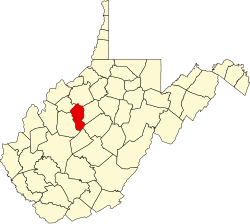Cremo, West Virginia | |
|---|---|
| Coordinates: 38°53′5″N81°12′36″W / 38.88472°N 81.21000°W | |
| Country | United States |
| State | West Virginia |
| County | Calhoun |
| Elevation | 709 ft (216 m) |
| Time zone | UTC-5 (Eastern (EST)) |
| • Summer (DST) | UTC-4 (EDT) |
| GNIS ID | 1554220 [1] |
Cremo is an unincorporated community in Calhoun County, West Virginia, United States.


